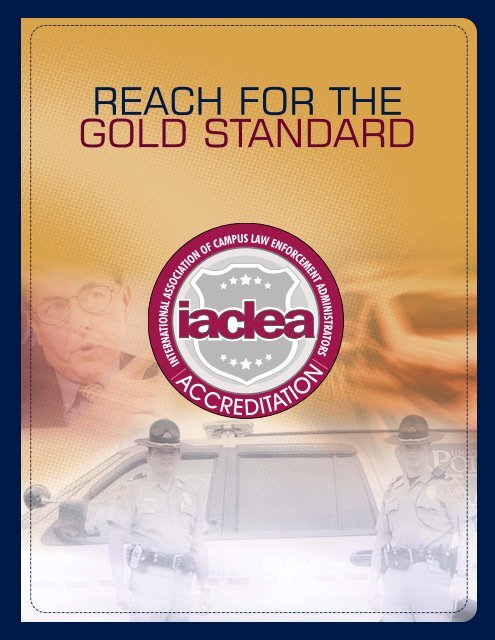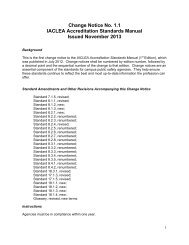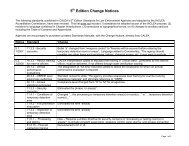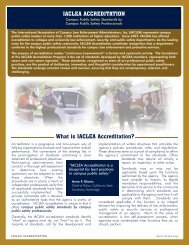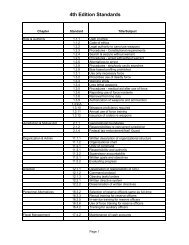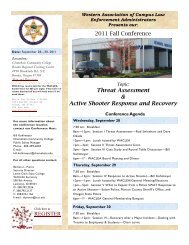Accreditation Brochure - IACLEA
Accreditation Brochure - IACLEA
Accreditation Brochure - IACLEA
You also want an ePaper? Increase the reach of your titles
YUMPU automatically turns print PDFs into web optimized ePapers that Google loves.
REACH FOR THE<br />
GOLD STANDARD
Introduction<br />
Adherence to the highest standards of professionalism and excellence is vital to the success of campus public safety<br />
departments in fulfilling their mission to protect students, faculty, staff, and the millions of yearly visitors to colleges<br />
and universities. The International Association of Campus Law Enforcement Administrators, Inc. (<strong>IACLEA</strong>), an<br />
association that represents campus public safety leaders at more than 1,000 institutions of higher education, is<br />
pleased to announce that it is now offering <strong>IACLEA</strong> <strong>Accreditation</strong> to colleges and university law enforcement,<br />
security, and public safety departments. <strong>IACLEA</strong> <strong>Accreditation</strong> constitutes recognition that a department conforms<br />
to the highest professional standards for campus law enforcement and protective services.<br />
This brochure explains the benefits of <strong>IACLEA</strong> <strong>Accreditation</strong>, provides a history of this program, spotlights four<br />
pilot agencies, and gives tips on selecting an <strong>Accreditation</strong> Manager and how to apply for <strong>IACLEA</strong> <strong>Accreditation</strong>.<br />
We urge all campus public safety departments to attain <strong>IACLEA</strong> <strong>Accreditation</strong> as a means to assure the public,<br />
parents, and the university community that your campus public safety agency adheres to the highest professional<br />
standards.<br />
Sincerely,<br />
Dolores Stafford,<br />
Chair, <strong>IACLEA</strong><br />
<strong>Accreditation</strong> Commission<br />
HISTORY OF THE <strong>IACLEA</strong><br />
ACCREDITATION PROGRAM<br />
<strong>IACLEA</strong>’s efforts to launch an <strong>Accreditation</strong> program began in 1995 with the publication of the first <strong>IACLEA</strong> Standards Manual.<br />
Written permission was obtained from the Commission on <strong>Accreditation</strong> for Law Enforcement Agencies, Inc. (CALEA) to use<br />
standards that had already been developed. The Standards Manual was intended as a guide to campus police and security agencies<br />
to improve the professionalism of their operations and management.<br />
In 1999, <strong>IACLEA</strong> conducted a member needs assessment survey, which identified the development of a campus<br />
agency/departmental <strong>Accreditation</strong> process as a priority. The Association created an <strong>Accreditation</strong> Committee in 2001 and charged<br />
it with reviewing and revising the existing standards and developing an <strong>Accreditation</strong> process. In 2003, <strong>IACLEA</strong> sought and was<br />
awarded a grant from the Office of Community Oriented Policing Services (COPS) within the U. S. Department of Justice. These<br />
funds were designed to defray the start-up costs of creating and implementing the <strong>Accreditation</strong> program. The funds were used for<br />
the part-time employment of the <strong>Accreditation</strong> Coordinator, travel to CALEA conferences and meetings, meetings of the <strong>IACLEA</strong><br />
<strong>Accreditation</strong> Committee, and other costs associated with the program’s development. A second COPS grant was secured in 2005<br />
to continue the support of the program through the pilot program phase. <strong>IACLEA</strong> began accepting applications for <strong>Accreditation</strong> in<br />
2006 and launched its “joint <strong>Accreditation</strong>” program, for CALEA-accredited agencies, in 2007. The first agencies were accredited<br />
at the 2007 <strong>IACLEA</strong> Annual Conference<br />
During the course of developing its program, <strong>IACLEA</strong> has cooperated with other law enforcement accrediting organizations, most<br />
notably CALEA, but also several state accreditation program providers. <strong>IACLEA</strong> is an active affiliate of AccredNet, an informal<br />
confederacy of state accreditation programs, sharing ideas, resources and experience.<br />
2<br />
- Revised July 2007
BENEFITS OF <strong>IACLEA</strong> ACCREDITATION<br />
u<br />
u<br />
u<br />
u<br />
u<br />
u<br />
u<br />
u<br />
Provides a professional benchmark for measuring policies and practices<br />
Assures the university administration, the community served, local law enforcement,<br />
and institutional peers of a high quality of service<br />
Ensures procedures are documented and staff is given clear guidance<br />
Enhances the recruitment and retention of qualified staff<br />
Ensures that staff is trained and functions according to established policy and procedure<br />
Strengthens an institution’s defense against complaints and lawsuits<br />
Boosts institutional pride and employee morale<br />
Provides periodic, professional review of department operations,<br />
administration, and services<br />
THERE ARE 5 STEPS TO THE <strong>IACLEA</strong><br />
ACCREDITATION PROCESS.<br />
1. Inquiry and Application – The department requests and receives<br />
information describing the <strong>IACLEA</strong> <strong>Accreditation</strong> process along<br />
with an application. At this time, the department is strongly<br />
encouraged to purchase the manual, Standards for Law<br />
Enforcement Agencies (5th Edition), directly from the<br />
Commission on <strong>Accreditation</strong> for Law Enforcement Agencies<br />
(CALEA). <strong>IACLEA</strong> will identify which CALEA standards are<br />
required for campus public safety accreditation. The<br />
department makes a voluntary decision to begin the <strong>IACLEA</strong><br />
<strong>Accreditation</strong> process by submitting the completed application<br />
and $350 fee. <strong>IACLEA</strong> staff will forward a second package to<br />
the agency, which includes the <strong>Accreditation</strong> Agreement, an<br />
invoice, a Department Profile Questionnaire (DPQ), and the<br />
<strong>IACLEA</strong> <strong>Accreditation</strong> Process Manual. Once the agency has<br />
determined that it will formally pursue <strong>IACLEA</strong> accreditation,<br />
the department’s Chief Executive Officer signs the agreement<br />
and submits the accreditation fee (refer to fee schedule on<br />
page 7). The department will have thirty-six (36) months, from<br />
the date that <strong>IACLEA</strong> endorses the agreement, to complete its<br />
self-assessment.<br />
2. Compliance Development and Review – The department now<br />
begins a thorough examination of its operational practices and<br />
written policies. Written directives may have to be prepared or<br />
modified. Systems or procedures may have to be established to<br />
meet standards’ requirements and ensure accreditation<br />
maintenance. Proofs of compliance with applicable standards<br />
must also be identified, copied and filed. The department will<br />
typically be required to meet ALL applicable standards. The<br />
compliance documentation must be arranged in such a manner<br />
as to easily facilitate review by accreditation assessors. When<br />
the department has completed compiling all necessary proofs<br />
and is satisfied that it has met all of the <strong>IACLEA</strong> standards’<br />
requirements, it contacts <strong>IACLEA</strong> staff to arrange for an onsite<br />
agency evaluation.<br />
3. Agency Evaluation - The <strong>IACLEA</strong> <strong>Accreditation</strong> Commission<br />
will select assessors to visit the department and review its<br />
overall compliance. The department will prepare a schedule of<br />
events for the agency evaluation to include interviews, tours<br />
and standards review. <strong>IACLEA</strong> will make all travel arrangements<br />
and accommodations and invoice the department. The<br />
assessors will review all standards, verifying compliance with<br />
applicable standards, as well as confirming non-applicable<br />
standards. Assessors will provide on-site feedback to the<br />
department as the assessment progresses. The assessors will<br />
prepare a formal written report and submit it to the <strong>IACLEA</strong><br />
<strong>Accreditation</strong> Commission.<br />
4. Commission Review - The final report will be distributed to a<br />
Compliance Review Panel of the <strong>IACLEA</strong> <strong>Accreditation</strong><br />
Commission. If the Compliance Review Panel is satisfied that<br />
the department has met all compliance criteria, the Compliance<br />
Review Panel will conduct a vote on whether to recommend the<br />
agency to the full Commission for a final vote. If a department<br />
is not in compliance with one or more of the standards, an<br />
extension of no more than 90 days may be granted by the<br />
<strong>IACLEA</strong> <strong>Accreditation</strong> Commission to allow the department to<br />
comply with the standard(s). A second evaluation may be<br />
required by the Commission to confirm compliance. When the<br />
<strong>IACLEA</strong> <strong>Accreditation</strong> Commission is satisfied that the<br />
department has met all compliance criteria, they will grant<br />
accreditation to the department. <strong>Accreditation</strong> is for a period<br />
of 3 years.<br />
5. Award and Maintenance - When the <strong>IACLEA</strong> <strong>Accreditation</strong><br />
Commission grants the agency accreditation, the agency will be<br />
notified via letter and will be invited to attend the next <strong>IACLEA</strong><br />
Annual Conference to receive their <strong>Accreditation</strong> Award. To<br />
retain the accredited status, the department must maintain<br />
compliance with all applicable standards. The department<br />
submits Annual Reports to the <strong>IACLEA</strong> <strong>Accreditation</strong><br />
Commission attesting to continuing compliance, as well as<br />
reporting changes or difficulties during the year. Prior to the<br />
end of the three-year period, the department will be required<br />
to apply to <strong>IACLEA</strong> for re-accreditation.<br />
3
PROFILES-PILOT INSTITUTIONS<br />
<strong>IACLEA</strong> selected four institutions to serve as pilot agencies when<br />
it sought to test its developing <strong>Accreditation</strong> program. The four<br />
institutions were intended to represent the different types of<br />
campuses and departments that would seek <strong>IACLEA</strong><br />
<strong>Accreditation</strong>. These include campus public safety departments<br />
with sworn officers, non-sworn officers, urban and suburban<br />
campuses, large public and small private institutions. The four<br />
pilot institutions reflect the diversity of public safety departments<br />
that can benefit from <strong>IACLEA</strong> <strong>Accreditation</strong>. They include a large<br />
public institution with sworn officers, a large private institution<br />
with non-sworn officers, a mid-sized private institution with nonsworn<br />
officers, and a small private institution with both sworn<br />
and non-sworn officers.<br />
CALIFORNIA STATE UNIVERSITY, NORTHRIDGE<br />
Northridge, CA<br />
Public<br />
Enrollment: 33,000<br />
Chief of Police/Director of Public Safety: Anne P. Glavin<br />
<strong>Accreditation</strong> Manager: Captain Scott Van Scoy<br />
Sworn Officers: 27<br />
Non Sworn Officers: 0<br />
Civilians: 53 (49 full-time, 4 part-time)<br />
Total Staff: 80<br />
Agency <strong>Accreditation</strong> was a top priority when Anne P. Glavin<br />
became Police Chief at California State University, Northridge.<br />
Glavin initiated an <strong>Accreditation</strong> process as one of four pilot<br />
agencies for <strong>IACLEA</strong>’s <strong>Accreditation</strong> program because she was<br />
familiar with <strong>Accreditation</strong> through her involvement as a<br />
Commissioner on the Massachusetts Law Enforcement<br />
<strong>Accreditation</strong> Commission and believed it was the best way to<br />
move the department forward.<br />
“I felt <strong>Accreditation</strong> was the best vehicle to take an agency that<br />
was going through ‘change management’ and move it forward,”<br />
Glavin said. “<strong>Accreditation</strong> is a blueprint for best practices in<br />
campus public safety.”<br />
<strong>IACLEA</strong> <strong>Accreditation</strong> provides the staff with a much stronger<br />
realization of best practices and professional standards, Glavin<br />
said. “If we are going to strive for excellence – and that is our<br />
mission – we have to strive to meet the highest professional<br />
standards. Third-party validation of those standards is essential,”<br />
she added.<br />
<strong>Accreditation</strong> is just beginning to take hold on the West Coast,<br />
she said. The California State University system, which is<br />
comprised of 23 higher education institutions, has adopted<br />
<strong>Accreditation</strong> as one of its audit standards and is recommending<br />
<strong>IACLEA</strong>’s <strong>Accreditation</strong> Standards as a benchmark.<br />
It is important, Glavin believes, to sell the concept of<br />
<strong>Accreditation</strong>, not only to the department staff, but to the entire<br />
university community. “You have to go to every corner of the<br />
university and tell them what it is, and how it benefits the<br />
university,” she said. “I use every opportunity to weave<br />
<strong>Accreditation</strong> into talks, speeches and presentations that I give.<br />
I do see progress…the staff and the university community are<br />
much more attuned to the concept and the benefits of<br />
<strong>Accreditation</strong>.”<br />
The administration at Cal State, Northridge, is also supportive.<br />
Dr. Mohammed Qayoumi, Vice President of Administration and<br />
Finance and Chief Financial Officer, said he sees two very<br />
important benefits of <strong>IACLEA</strong> <strong>Accreditation</strong>. “First, <strong>IACLEA</strong><br />
<strong>Accreditation</strong> identifies good practices and provides affirmation by<br />
a third party for these practices,” Dr. Qayoumi said. “Secondly,<br />
and as important, <strong>IACLEA</strong> <strong>Accreditation</strong> identifies opportunities<br />
for improvement. This affords public safety with an opportunity to<br />
make its operations even better.”<br />
The <strong>Accreditation</strong> process produces written documents, policies,<br />
and procedures that become important, not only as resources for<br />
current officers and staff, but also as orientation and training<br />
tools for new officers.<br />
“The Administration has been absolutely behind the <strong>IACLEA</strong><br />
<strong>Accreditation</strong> process,” he said. “The President supports it.<br />
Self-assessment through <strong>Accreditation</strong> is part of the culture<br />
of our university.”<br />
Testimonials – <strong>IACLEA</strong> <strong>Accreditation</strong><br />
“<strong>IACLEA</strong> <strong>Accreditation</strong> is a blueprint for best practices in campus<br />
public safety.”<br />
--Anne P. Glavin, Chief of Police,<br />
California State University, Northridge<br />
“There are at least two very important benefits of <strong>IACLEA</strong><br />
<strong>Accreditation</strong>. First it identifies good practices and provides<br />
affirmation by a third party for these practices. Secondly, and as<br />
important, it identifies opportunities for improvement. This affords<br />
public safety with an opportunity to make its operations even<br />
better.”<br />
--Dr. Mohammed Qayoumi, Vice President for Administration<br />
and Finance, California State University, Northridge<br />
“As a non-sworn department, there was really nowhere for us to<br />
turn for guidance on professional standards and policies until the<br />
<strong>IACLEA</strong> <strong>Accreditation</strong> program came along.”<br />
“When your department has met all of the requirements of the<br />
<strong>IACLEA</strong> <strong>Accreditation</strong> standards, it will earn you the respect of<br />
local law enforcement agencies. It is beneficial to the university to<br />
be able to state that it has an accredited public safety<br />
department.”<br />
--Regina Lawson, Chief of Police, Wake Forest University.<br />
“The greatest benefit of <strong>IACLEA</strong> <strong>Accreditation</strong> is achieving<br />
conformity and consistency in terms of how we do things and what<br />
procedures we follow. There are different ways of doing things…We<br />
have written policies we can reference now so there is uniformity<br />
and consistency.”<br />
--Shane Hapuarachy, <strong>Accreditation</strong> Manager,<br />
University of Southern California<br />
--Bernard D. Gollotti, Senior Associate Vice President for<br />
Public Safety, Drexel University<br />
4
UNIVERSITY OF SOUTHERN CALIFORNIA<br />
Los Angeles, CA<br />
Private<br />
Enrollment: 33,000<br />
Executive Director and Chief of Police: Carey Drayton<br />
<strong>Accreditation</strong> Manager: Shane Hapuarachy<br />
Sworn Officers: 0<br />
Non Sworn Officers 91<br />
Civilians: 116<br />
Total Staff: 207<br />
A major benefit of <strong>IACLEA</strong> <strong>Accreditation</strong> for the University of<br />
Southern California is the opportunity to review its directives and<br />
policies with an eye toward achieving consistency, according to<br />
Shane Hapuarachy, Director of Administrative Operations and<br />
<strong>Accreditation</strong> Manager for the Department of Public Safety.<br />
“<strong>Accreditation</strong> has resulted in a uniformity and a consistency in<br />
terms of how we do things,” Hapuarachy said. In some cases, the<br />
self-assessment process has identified different and better ways<br />
of doing things in the department. It has also generated new<br />
written policies that can now be applied and referenced.<br />
USC has involved all supervisors from the sergeant level and<br />
higher in the policy review and drafting process. The department<br />
has achieved buy-in for the process by explaining why it is pursuing<br />
<strong>Accreditation</strong> and the expected benefits. USC has also promoted<br />
the program through a poster emblazoned with the words:<br />
“Professionalism/Accountability/Excellence.”<br />
Periodic bulletins with progress reports on the <strong>Accreditation</strong><br />
process have helped to keep department staff informed and have<br />
re-enforced the aspect that this is an going and active process.<br />
One of the many benefits of the process is the establishment of a<br />
training committee with representation from the DPS staff,<br />
students, and university units involved in training.<br />
DREXEL UNIVERSITY<br />
Philadelphia, PA<br />
Private<br />
Enrollment: 18,000<br />
Senior Associate Vice President for Public Safety: Bernard Gollotti<br />
<strong>Accreditation</strong> Manager: Shawn Woods<br />
Sworn Officers:<br />
Non Sworn Officers: 110 (contract force)<br />
Civilians: 20<br />
Total Staff: 130<br />
Drexel University, located in the University City section of West<br />
Philadelphia, chose to pursue <strong>IACLEA</strong> <strong>Accreditation</strong> because it was<br />
seeking another resource to provide guidance and to ensure its<br />
campus public safety department was operating according to best<br />
practices, said Bernard D. Gollotti, Senior Associate Vice<br />
President for Public Safety. “As a non-sworn department, there<br />
was really nowhere for us to turn for guidance on professional<br />
standards and policies until the <strong>IACLEA</strong> <strong>Accreditation</strong> program<br />
came along,” Gollotti said.<br />
The chief benefits of <strong>IACLEA</strong> <strong>Accreditation</strong>, according to Gollotti,<br />
are recognition through <strong>IACLEA</strong> and acceptance and recognition<br />
through the university community of the public safety function.<br />
<strong>Accreditation</strong> also provides assurances that the department is<br />
operating in accordance with the highest standards and practices.<br />
“Students at times look at us as a non-sworn agency as not being<br />
able to do anything, but the reality is that we are able to do many<br />
things to enhance public safety,” he said.<br />
<strong>IACLEA</strong> <strong>Accreditation</strong> also helps to reassure parents. “It provides<br />
assurances to parents that there is a high level of professionalism<br />
in our campus public safety department,” he said.<br />
The self-assessment process has assisted Drexel by providing a<br />
system of checks and balances. “It has given us an opportunity to<br />
benchmark what we do now with what we did before we began the<br />
process,” he said. “It points out areas where enhancements can<br />
be made. It also tells us what we have been doing well.”<br />
Another benefit of the self-assessment process is that it provides<br />
the department with an opportunity to prepare After Action<br />
Reports and, in some cases, initiate improvements in procedures.<br />
“I would strongly recommend that every campus public safety<br />
department should get involved in the <strong>IACLEA</strong> <strong>Accreditation</strong><br />
process,” he said.<br />
WAKE FOREST UNIVERSITY<br />
Winston-Salem, NC<br />
Private<br />
Enrollment: 6,700<br />
Chief of Police: Regina G. Lawson<br />
<strong>Accreditation</strong> Manager: Preston Oldham<br />
Sworn Officers: 19 fulltime, 10 part time<br />
Non sworn Officers: 24 (security officers)<br />
Civilians: 6<br />
Total staff: 58<br />
Wake Forest University, a small, private institution located in<br />
Winston-Salem, NC, decided to seeking <strong>IACLEA</strong> <strong>Accreditation</strong><br />
because it was already considering the idea of pursuing<br />
accreditation through the Commission on <strong>Accreditation</strong> of Law<br />
Enforcement Agencies (CALEA).<br />
Recognition of a campus public safety department’s achievement<br />
of professional standards is one of the primary benefits of <strong>IACLEA</strong><br />
<strong>Accreditation</strong>, said Regina G. Lawson, Chief of Police at Wake<br />
Forest. “When your department has met all of the requirements<br />
of the <strong>Accreditation</strong> standards, it will earn you the respect of<br />
local law enforcement agencies and it is beneficial to the university<br />
to be able to state that it has an accredited public safety<br />
department,” Lawson said.<br />
Another benefit is that the self-assessment review and the<br />
<strong>Accreditation</strong> process as a whole “forces you to stay in a<br />
continuous improvement mode,” Lawson said. “As part of the<br />
process, you are constantly reviewing standards and policies.<br />
<strong>Accreditation</strong> does not allow you to let your agency slide or fall<br />
behind. It pushes you to improve.”<br />
Wake Forest’s administration supports the <strong>IACLEA</strong> <strong>Accreditation</strong><br />
process. Lawson said she has gained buy-in from the staff by<br />
explaining the benefits of <strong>IACLEA</strong> <strong>Accreditation</strong> to the department<br />
as a whole and to the individual officers. “<strong>IACLEA</strong> <strong>Accreditation</strong><br />
means additional training, meeting standards that reflect the<br />
highest standard for an officer, and recognition among their peers<br />
and municipal agencies that they work for an Accredited<br />
department. It really elevates their professional status.”<br />
The administration understands the value of <strong>Accreditation</strong>.<br />
“Colleges and universities are much more familiar with the<br />
accreditation processes and the value they add to the<br />
institution,” Lawson said. “In our case, this increased the<br />
administrative support and ‘buy in’ to the <strong>IACLEA</strong> <strong>Accreditation</strong><br />
program. In most cases, it would be easier for a chief to ‘sell’ the<br />
accreditation concept to university administrators than it has<br />
been for some of my municipal counterparts,” she said.<br />
A major benefit of the self-assessment process is that it allows<br />
you to evaluate procedures and identify improvements in practices<br />
and procedures, such as protocols and response procedures. In<br />
regard to policy improvements, Wake Forest completely overhauled<br />
the standard operating procedures manual. “Although keeping<br />
policies and procedures current is an on-going challenge, the selfassessment<br />
process required us to address and update the<br />
entire manual at one time,” Lawson said. “This was labor intensive<br />
for the accreditation manager but very beneficial to the<br />
department. Response to domestic violence and mental<br />
commitment incidents were two keys areas that we deal with<br />
frequently, that were greatly improved by this process,’ she said.<br />
It also identifies equipment items that need to be purchased to<br />
meet professional standards. As part of the self assessment<br />
process, Wake Forest evaluated its crowd control and civil<br />
disobedience procedures and made improvements, she said.<br />
5
TIPS FOR SELECTING AN<br />
ACCREDITATION MANAGER<br />
The selection of a qualified, dedicated, and highly organized<br />
<strong>Accreditation</strong> Manager is a key to success in pursuing <strong>IACLEA</strong><br />
<strong>Accreditation</strong> for campus public safety departments.<br />
Campus public safety leaders and <strong>Accreditation</strong> managers at the<br />
four pilot institutions for <strong>IACLEA</strong>’s <strong>Accreditation</strong> program<br />
identified a number of key skills and attributes for a successful<br />
<strong>Accreditation</strong> Manager:<br />
Superior organizational and project management skills. Managing<br />
the <strong>Accreditation</strong> process requires the ability to establish time<br />
lines, meet deadlines, and ensure that others are completing<br />
tasks on a timely basis. ”You’ve got to make <strong>Accreditation</strong> a<br />
priority,” said Scott Van Scoy, <strong>Accreditation</strong> Manager for<br />
California State University, Northridge. “You need to budget your<br />
time wisely, figure out how much time you need, and make sure<br />
you spend the time to properly manage the program,” he said.<br />
Exceptional verbal and written communication skills. The<br />
<strong>Accreditation</strong> Manager takes an active role in constructing<br />
written policies, guidelines, and directives that will direct the<br />
agency and its employees. Whether serving as the writer or editor<br />
in reviewing these written materials, the manager is heavily<br />
involved in producing written policies and procedures. Oral<br />
communication is just as important. The manager must be an<br />
effective speaker who can promote the program, explain the<br />
process, and generate support for <strong>Accreditation</strong>, both within the<br />
agency and in working with other campus departments. “The<br />
biggest issue is communication,” said Shawn Woods,<br />
<strong>Accreditation</strong> Manager for Drexel University. “You must<br />
communicate with personnel, including co-workers, subordinates,<br />
peers, and supervisors…You have to get everyone involved to<br />
achieve buy-in.”<br />
Commitment to the agency and to the <strong>Accreditation</strong> process. The<br />
manager must be committed to staying with the agency and<br />
seeing through the <strong>Accreditation</strong> process and must be able to<br />
work through the issues involved in achieving <strong>Accreditation</strong>. “The<br />
individual you select must be detail-oriented, committed to staying<br />
with the agency, and willing to see the process through,” said<br />
Regina Lawson, Chief of Police at Wake Forest University. “The<br />
individual must be forward thinking and be able to see the benefits<br />
of <strong>Accreditation</strong> five years down the road,” she said.<br />
Focused and able to balance multiple priorities. A major<br />
responsibility of the manager is to oversee the self-assessment<br />
process – that part of the <strong>Accreditation</strong> process in which the<br />
agency reviews the standards and confirms its compliance with<br />
the relevant standards. Skills involved in completing the selfassessment<br />
process include reviewing, drafting and editing<br />
written policies and procedures, training agency members,<br />
assembling accreditation files, planning and scheduling activities,<br />
and serving as the primary liaison with <strong>IACLEA</strong>’s <strong>Accreditation</strong><br />
staff. “My advice is to stay on track and stay focused,” said<br />
Shane Hapuarachy, <strong>Accreditation</strong> Manager at the University of<br />
Southern California. “It’s pretty easy to get sidetracked on day to<br />
day activities associated with accreditation. It’s not just a matter<br />
of moving the process along, but also making a concerted effort to<br />
build support for it,” he said.<br />
Ability to keep staff informed of progress. To achieve support from<br />
agency staff, it is necessary for the manager to explain the<br />
benefits of <strong>Accreditation</strong> to the staff. It is also advisable to<br />
provide periodic updates on the progress being made in order to<br />
keep the process on track. “You should send periodic bulletins out<br />
to staff to note the progress being made to keep it on people’s<br />
radar screens,” Hapuarachy said.<br />
Thorough knowledge and understanding of the <strong>Accreditation</strong><br />
Process and Standards. There is a good chance that your choice<br />
as manager is an existing employee who may have strong<br />
organizational skills, but little knowledge of the process and the<br />
standards that must be met to achieve <strong>IACLEA</strong> <strong>Accreditation</strong>. It<br />
is important to provide opportunities for your <strong>Accreditation</strong><br />
Manager to attend training programs offered by <strong>IACLEA</strong> and other<br />
accrediting agencies. It is also useful to network with other<br />
<strong>Accreditation</strong> Managers. “Call them for advice,” Van Scoy said.<br />
“Attend meetings with other <strong>Accreditation</strong> Managers. Discuss<br />
common issues and problems, identify best policies and<br />
practices,” he said.<br />
Willingness to learn and network with peers. The Manager must<br />
be willing to take the time to learn about <strong>Accreditation</strong> and the<br />
process involved in preparing a department for <strong>Accreditation</strong>.<br />
“Networking at all levels is critical,” said Preston Oldham,<br />
<strong>Accreditation</strong> Manager at Wake Forest University. “You should<br />
network not only with other <strong>Accreditation</strong> managers, but also<br />
within your university with other departments. You should keep<br />
them apprised of the progress. You may need something from<br />
Finance or Human Resources or Residential Life and it helps to<br />
have those relationships,” Oldham said.<br />
Although some agencies do not have the resources to employ a<br />
full-time <strong>Accreditation</strong> Manager, chiefs and <strong>Accreditation</strong><br />
Managers at the four pilot agencies for the <strong>IACLEA</strong> <strong>Accreditation</strong><br />
program agree that the department must be able to identify and<br />
support a manager who can spend a significant portion of his or<br />
her time overseeing the process.<br />
“It’s a fine balance,” Oldham said. “If you have the luxury of being<br />
able to have a fulltime <strong>Accreditation</strong> Manager, there is certainly<br />
enough work to do to keep someone busy fulltime. With a small<br />
agency there is a high probability you will have an <strong>Accreditation</strong><br />
Manager with split duties.”<br />
REDUCING LEGAL LIABILITY<br />
THROUGH <strong>IACLEA</strong> ACCREDITATION<br />
Negligent security cases are an emerging area of civil law as crime<br />
victims increasingly attempt to hold the premise owners and not<br />
the actual perpetrators civilly liable for crimes against them.<br />
Whenever a negligent security claim is brought against a<br />
university, that university and its campus public safety or security<br />
agency must demonstrate that it has established and adheres to<br />
reasonable security standards. Achieving and maintaining<br />
<strong>Accreditation</strong> is one manner in which campus security agencies<br />
can demonstrate compliance with professionally accepted<br />
standards of operation for law enforcement and security agencies.<br />
<strong>Accreditation</strong>, therefore, may make it more difficult to hold an<br />
institution liable for the criminal actions of a third party since the<br />
institution is able to demonstrate it acted with reasonable care in<br />
ensuring the security of its premises.<br />
This assertion is supported by four independent studies by risk<br />
management groups and cited by the Commission on <strong>Accreditation</strong><br />
for Law Enforcement Agencies, Inc. (CALEA) on their web site<br />
(http://www.calea.org/newweb/RiskManagement/riskmanage.htm).<br />
These surveys examined the differences in claims and judgments<br />
against accredited and non-accredited police departments. In each<br />
case, the researchers found that professional liability was<br />
prevented and losses were reduced among departments that were<br />
accredited.<br />
“Participating in an accreditation process forces departments to<br />
ensure that they adhere to appropriate standards regarding their<br />
facilities, equipment, training and policies,” said attorney Elliot B.<br />
Spector, Principal for the Connecticut Criminal Law Foundation,<br />
which provides training to law enforcement agencies. “In the last<br />
five years, the most common administrative civil rights actions<br />
have been in the areas of failure to train and inadequate or<br />
unconstitutional policies. A natural protection against such claims<br />
is the upgrading of training and policies,which should occur during<br />
the accreditation process,” said Spector, who has presented<br />
educational workshops on civil rights and police civil liability for the<br />
International Association of Chiefs of Police annually since 1992.<br />
6
<strong>IACLEA</strong> ACCREDITATION COMMISSION<br />
The <strong>Accreditation</strong> Commission is the Association’s governing body<br />
for the <strong>IACLEA</strong> <strong>Accreditation</strong> Program. Established as a<br />
Committee by the Board of Directors in 2001, it was recently<br />
reconstituted as a Commission. As such, it is empowered by the<br />
Board to develop, revise and interpret accreditation standards and<br />
procedures. It also holds the authority to grant or deny<br />
accreditation to agencies, based upon their compliance with<br />
applicable standards.<br />
The Commission consists of twelve voluntary members, nine of<br />
which are <strong>IACLEA</strong> members appointed by the President and<br />
confirmed by the Board. Particular care is taken to ensure that<br />
the Commission membership is representative of the diversity of<br />
the Association. To the extent possible, efforts are made to<br />
include representatives of both two- and four-year institutions;<br />
sworn and non-sworn agencies; public and private institutions; and<br />
the six geographic regions within the United States, as well as<br />
Canada. Additional members are drawn from allied associations,<br />
including a business officer, appointed by the National Association<br />
of College and University Business Officers; a student affairs<br />
officer, appointed by the National Association of Student Personnel<br />
Administrators; and a college president, appointed by the<br />
American Council on Education or from one of the other three<br />
college presidents’ associations.<br />
Commission members serve a five year term, with a maximum of<br />
two consecutive terms. When the Commission was first<br />
established, terms were staggered for periods of one, two or<br />
ADDITIONAL INFORMATION<br />
The <strong>IACLEA</strong> web site (www.iaclea.org) is a particularly good resource<br />
for general information about the <strong>Accreditation</strong> Program. Simply<br />
click on the "<strong>Accreditation</strong>" tab on the left side of the home page and<br />
it will give you access to several links, including the following:<br />
"Frequently Asked Questions", which provides general information<br />
about the benefits, fees and procedures of accreditation; “Agencies<br />
in <strong>Accreditation</strong>”, which identifies departments that have applied to<br />
the program, as well as those that have achieved <strong>Accreditation</strong>;<br />
three years. Periodically, members of the Commission become<br />
eligible for reappointment or replacement. This process is intended<br />
to enhance continuity within the Commission, while the occasional<br />
rotation of members ensures new ideas and a fresh perspective<br />
are infused in the program.<br />
Generally, meetings are held twice a year; once in conjunction with<br />
the Association’s Annual Conference and again in the late fall or<br />
early winter. Throughout the remainder of the year, Commission<br />
members and Association staff work to develop and enhance the<br />
accreditation process. The Commission has created two standing<br />
committees to concentrate on critical elements of the program.<br />
The Standards Review and Interpretation Committee periodically<br />
reviews <strong>IACLEA</strong> standards, ensuring that they are up-to-date and<br />
consistent with current campus public safety practices. They may<br />
recommend, for the Commission’s approval, the revision or<br />
deletion of standards, as well as develop new standards. The<br />
Assessor Committee establishes the selection criteria for<br />
assessors, develops and coordinates training for assessors,<br />
creates the procedural guidelines for assessors, and monitors and<br />
evaluates the on-site and assessor critiques.<br />
The <strong>Accreditation</strong> Commission is committed to the development<br />
and maintenance of an accreditation program that encompasses<br />
the highest professional standards for campus law enforcement<br />
and public safety. Further, it is intent on providing a process of<br />
review and assessment that is applicable to the entire<br />
membership.<br />
“<strong>Accreditation</strong> Standards”, which lists the CALEA standards that<br />
the <strong>IACLEA</strong> <strong>Accreditation</strong> Commission has identified as applicable<br />
to campus public safety agencies and required for <strong>IACLEA</strong><br />
<strong>Accreditation</strong>; and “Recent Developments”, which offers periodic<br />
up-dates on the status of the program.<br />
Individuals, agencies or institutions, interested in <strong>IACLEA</strong><br />
<strong>Accreditation</strong>, are encouraged to contact the <strong>Accreditation</strong><br />
Coordinator: jleonard@iaclea.org<br />
Fee Schedule<br />
Application Fee: $350, which includes publications,<br />
forms and contract. Fee is nonrefundable, unless<br />
agency is ineligible to participate in accreditation<br />
program. Fee may be applied to accreditation fee<br />
if contract is signed within 6 months.<br />
<strong>Accreditation</strong> Fee: Graduated according to the<br />
number of “full-time equivalents” enrolled at the<br />
institution. The fee may be paid in full or two annual<br />
installments. Non-members will be assessed an<br />
additional $1,500.<br />
Note: Full-Time Equivalent enrollment, as calculated in the most recent<br />
listing of the U.S. Department of Education’s Integrated Postsecondary<br />
Education Data System (IPEDS).<br />
<strong>Accreditation</strong> Fee<br />
# Full Time Single Payment Installment<br />
Equivalent’s<br />
- 1,999 $4,896 $2,693<br />
2,000 – 4,999 $5,386 $2,963<br />
5,000 – 9,999 $5,925 $3,259<br />
10,000 – 19,999 $6,518 $3,585<br />
20,000+ $7,170 $3,944<br />
Assessment Fee: Candidate departments pay<br />
$1,000 for each assessor assigned and $2,000<br />
for the Team Leader. They also pay travel, lodging<br />
and meal expenses for the assessors.<br />
*Fee schedule subject to change<br />
7
International Association of Campus Law<br />
Enforcement Administrators (<strong>IACLEA</strong>)<br />
Since 1958, <strong>IACLEA</strong> has steadily grown and has<br />
emerged as a leader in representing the interests<br />
of campus law enforcement, security, and public<br />
safety for campuses around the world. Today, with<br />
more than 1,000 member institutions and more<br />
than 1,600 professional members, <strong>IACLEA</strong> is a<br />
strong, vibrant organization that is working to<br />
strengthen the campus public safety department<br />
and deliver quality programs and services to<br />
campus public safety leaders.<br />
WHY SHOULD YOUR PUBLIC SAFETY<br />
DEPARTMENT BELONG TO <strong>IACLEA</strong>?<br />
u<br />
u<br />
Annual Conferences and Regional Meetings focusing on<br />
Professional Development<br />
Opportunities to access and share information through <strong>IACLEA</strong>’s<br />
web site and list serves.<br />
u<br />
Campus Law Enforcement Journal, published six times a year<br />
u<br />
Management Training and Education, including the Executive<br />
Development Institute<br />
u<br />
u<br />
Publications and Web Seminars<br />
Timely updates and workshops on compliance with the Clery Act<br />
<strong>IACLEA</strong>'s Core Purpose:<br />
“To represent and promote campus public safety.”<br />
For more information about <strong>IACLEA</strong><br />
including membership, contact:<br />
International Association of Campus Law<br />
Enforcement Administrators<br />
342 North Main Street, West Hartford, CT 06117<br />
Telephone: (860) 586-7517<br />
Web site: www.iaclea.org<br />
E-mail: info@iaclea.org<br />
u<br />
u<br />
u<br />
Free WMD awareness and Incident Command training to campus<br />
public safety officers<br />
Government Relations through U.S., Canada and International<br />
Committees that monitor legislation that affects your institution,<br />
and representation in Washington D.C.<br />
<strong>Accreditation</strong> program for campus public safety departments


